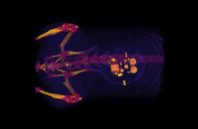For the last 30 years or so, many with severe bladder issues have been treated with stimulators that send an electric current to the nerve that controls the bladder. Such implants improve incontinence and overactive bladder, but they also can disrupt normal nerve signaling to other organs. Recognizing this, a team of researchers from the Washington University School of Medicine in St. Louis (St. Louis, MO), the University of Illinois at Urbana-Champaign (Champaign, IL), and the Feinberg School of Medicine at Northwestern University (Chicago, IL) has developed an implantable device with tiny light-emitting diodes (LEDs) that has potential to help people with bladder problems bypass the need for medication or electronic stimulators.
The researchers created a soft, implantable device that can detect overactivity in the bladder and then use light from bio-integrated LEDs to reduce the urge to urinate. The device works in laboratory rats and one day may help people who suffer incontinence or frequently feel the need to urinate.

 (585) 768-2513
(585) 768-2513

